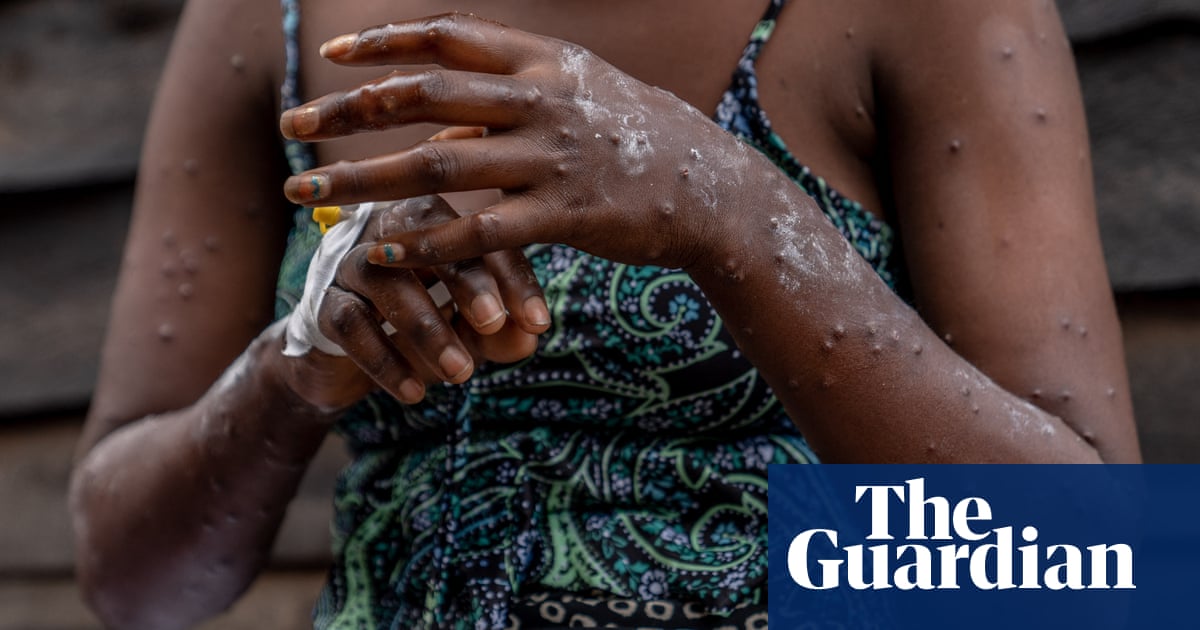Malawi’s ministry of health hasannounced three new cases of mpox in the capital, Lilongwe, bringing the number of confirmed cases to 11 since the country’s first was reported in April.
Malawi is one of 16 countries inAfricareporting mpox outbreaks as health officials battle with vaccine shortages as well as limited testing and hospital capacity.
The Public Health Institute ofMalawisaid the patients were aged between 17 and 41. “Investigations are under way to establish the possible source of infection and trace contacts,” the department said in a statement last week.
The first cases in Malawi come after US government aid cuts to healthcare, including HIV programmes, badly hit the country and raised fears of an escalation of infectious diseases. HIV medication programmes have been severely depleted by the cuts, said Richard Mvula, spokesperson for the Lilongwe district health office.
“A commonality about these cases is that some were immunocompromised,” he said, adding that people who had been on ART (antiretroviral therapy) had stopped taking their medication because of shortages brought about by the US cuts.
HIVcan worsen the risk and severity of mpox, while effective HIV treatment can help manage the risk. People living with HIV, especially those with uncontrolled viral loads, may experience a more severe form of mpox.
Malawi had been on alert since theglobal mpox outbreakbegan in 2022 in the Democratic Republic of the Congo and several other African countries.
The news of the first cases last month prompted fears of an outbreak. While most cases have been restricted to Lilongwe, a two-year-old was found with the condition in Mangochi district, about 150 miles (240km) from the capital.
While recorded cases remain low in Malawi, one of the poorest countries in the world, mpox has surged in the region overall. The Africa Centers for Disease Control and Prevention (Africa CDC)reports 52,082 casessince the beginning of 2025, with more than 1,770 deaths during the outbreak as a whole.
In a briefing to journalists last week, Africa CDC officials said they were seeing different patterns of transmission between countries. In Sierra Leone, where cases are rising “exponentially”, the clade IIb form of the virus is circulating. In the DRC and its neighbours it is clade Ia and Ib that dominate.
They said the continent would need about 6.4m doses of vaccine, but was still far from having that available, with only 1.3m received so far. They also highlighted a lack of testing capacity in many countries, and warned that in Sierra Leone patients were being treated two to a bed.
Malawi’s health system faces many challenges, including long distances to clinics, insufficient funding, a shortage of equipment and a lack of qualified personnel.In March this year, the Joint UN Programme on HIV and Aids drew attention to the immediate risks of the US funding cuts on HIV programmes in Malawi.
The programme cited thousands of HIV prevention drugs (PrEP) which were expiring. It said the government has instructed the remaining implementer to continue with the scaling up of injectable PrEP but to only recruit new pregnant and lactating women.
The US government had been providingmore than $350m (£282m) to Malawiannually, according to the US Department of State.
Knowledge of mpox around the country is low, reminiscent of the Covid-19 outbreak where myths were rife and people resorted to tree leaves and herbs to cure the symptoms. Thousands of people died.
A series of interviews across the capital showed most people have no knowledge of mpox. In central Lilongwe, taxi driver Steven Banda outlined what he knew.
“I came across an official from the ministry of health who was explaining about it and advised that we should be careful since it is dangerous. She described the symptoms including swellings, and mentioned some of the districts affected. I’m not aware of any cases in my area or seen anyone suffering from the disease. We don’t know much about it,” he said.
Dr Victor Mithi, the president of Malawi’s Society of Medical Doctors, said there is need for significant vigilance among practitioners within hospitals to make sure that “as we perform our day-to-day clinical procedures, we are able to screen those patients that may be having this condition”.
“It is a big concern because in Malawi, most people live in crowded houses and still believe that as a form of expression of love, you need to shake hands, you need to hug people and all those things which are basically the risk factors in the transmission of this disease.”
Mithi said that with the lessons drawn from Covid-19 and other infectious diseases, Malawi had the capacity to manage mpox, at clinical and community level.
“The challenge exists though because of the withdrawal of the US aid; the capacity of our healthcare system is no longer the same. Almost 60% of our healthcare system is donor dependent, of which more than 50% of the donor aid was coming from [the US]. So the withdrawal means that our healthcare system is completely shaken, we are left in a state where we didn’t build internal capacities to sustain ourselves,” Mithi added.
